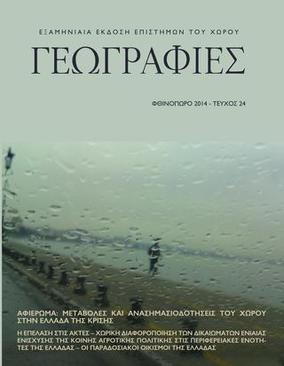Against and beyond the crisis : the role of urban social movements
Part of : Γεωγραφίες ; Vol.22, 2013, pages 67-72
Issue:
Pages:
67-72
Parallel Title:
Ενάντια και πέρα από την κρίση : ο ρόλος των κοινωνικών κινημάτων πόλης
Author:
Abstract:
In this paper, Margit Mayer provides critical and theoretical reflections on “cities for people”, neoliberalism, and social movements, in the context of the current crisis. In contrast to the more monolithic and homogeneous conception of the world-wide neoliberalism, and, also, in contrast to poststructuralist positions, which have emphasized on the unique particularities of specific neoliberal formations, the author prefers to speak of neoliberalization instead of neoliberalism as an open-ended process of market- oriented regulatory restructuring. Following the conceptualization suggested by Jamie Peck, Neil Brenner, and Nik Theodore, she distinguishes between neoliberal ideology and practice, since neoliberal ideology aspires to a utopia of free markets, but in practice the neoliberal project has entailed the intensification of state intervention in order to manage the consequences and contradictions of such marketization. The contradictions of these neoliberalization processes of the urban space are mirrored in the arena of social movements. Thus, the field of struggle, even if it is enormously heterogeneous and fragmented in terms of locality and context-specificity, is important to move towards a more networked, and transnationally orchestrated formation which will be able eventually to dismantle the neoliberal rule regime.
Subject:
Subject (LC):
Notes:
Το κείμενο αυτό παρουσιάστηκε στη δημόσια εκδήλωση που πραγματοποιήθηκε στο πλαίσιο του τριήμερου εργαστηρίου «Καθεστώτα κρίσης και αναδυόμενα κοινωνικά κινήματα στις πόλεις της Νότιας Ευρώπης», ΕΜΠ 8 Φεβρουαρίου 2013, Αθήνα.
References (1):
- 3. "This dominance of the financial market, and neoliberalism, came to an end August 2008. Postneoliberal strategies can still lead to a restructuring of capitalism," he wrote in "Postneoliberalism or postcapitalism? The failure of neoliberalism in the financial market crisis," Development Dialogue 51, 2009: 73-87. 4. Aihwa Ong (in "Neoliberalism as a mobile technology") employs a concept of neoliberalism as a "migratory set of practices"/ "a migratory technology of governing" / "a technique of administration," which is actually a static concept. 5. Cf. Neil Brenner/Nik Theodore (eds.) «Spaces of Neoliberalism. Urban Restructuring in North America and Western Europe», Oxford: Blackwell 2002. 6. Peck/Theodore/Brenner, "Neoliberal Urbanism: Models, Moments, Mutations," The SAIS Review of International Affairs, 29/1, winter/spring 2009. 7. Brenner/Peck/Theodore, "After Neoliberalization?" 2010, p. 10 in Ms. 8. "…market-disciplinary reform agendas were institutionalized on a world scale through … worldwide, multilateral, multilevel, supranational juridico-institutional reforms … Through … marketdisciplinary redesign of global and supra-national arrangements, from the OECD, the Woρld Bank and the IMF to the WTO, the post-Maastricht EU and NAFTA… neoliberalization processes came to impact and restructure the very geoinstitutional frameworks of governing national and subnational forms of regulatory experimentation (Brenner/ Peck/Theodore, "After neoliberalization?" Ms p. 10). 9. That is when "… the inherited institutional frameworks of neoliberalization are infiltrated at all spatial scales by social forces and political alliances oriented towards alternative, market- restraining agendas" (such as capital and exchange controls, debt forgiveness, progressive tax regimes, non-profit based, cooperatively run, deglobalized credit schemes, global redistribution, public works investments, decommodification and deglobalization of basic social needs), i.e. when "… an alternative … solidaristic and/or eco-socialist model of global regulation … (emerges, characterized by) radical democratization of decision-making and allocation capacities at all spatial scales" (13-14). 10. You can read up on these in my contribution to CITY 13/no 2-3 (2009) or in Cities for People, not for Profit, edited by Neil Brenner, Peter Marcuse, Margit Mayer, Routledge 2012. 11. Cf. NYT study on bidding wars: Louise Story, "As companies seek tax deals, governments pay high price," NYT December 1, 2012. Cf. also Jamie Peck: "Grant hustling and investment-chasing entrepreneurialism … become (even) less of a willed political strategy, more of a fiscal necessity," Austerity Urbanism: American Cities under extreme economy, in: CITY 16/6 (Dec 2012), 626-655. 12. Stuart Hodkinson, "The new urban enclosures," CITY 16/5 (October) 2012, pp. 500- 518. 13. Cf. K. Beckett, S. Herbert, Banished. The New Social Control in Urban America. Oxford UP 2010; Brenner/Theodore 2002: "Cities and the geographies of actually existing neoliberalism," Antipode, 34/3, 349- 379. 14. Erica Goode, "Crime increases in Sacramento after deep cuts to police force", NYT, November 3, 2012. 15. Monica Davey, "Safety is issue as budget cuts free prisoners," NYT, March 5, 2010, p. A 1. 16. Monica Davey, "Darker nights as some cities turn off the lights," NYT, 29 December 2011, p. A15. 17. Cf. Peck 2012, p. 650-51. 18. Cf. for Berlin Scharenberg/Bader 2009: 331; for Detroit: Kathy Hughes, "Is Detroit the new Brooklyn?" The need to know on PBS, July 7, 2011 http://www.pbs.org/wnet/need-to-know/the-dailyneed/ is-detroit-the-new- brooklyn/10290/, James Tulloch, "Detroit: von der Geister-zur Gartenstadt," Allianz, July 14, 2011. http://www. wissen.allianz.at/?1554/gruene- staedte- detroit- von- geister- zur- gartenstadt). 19. Cf. http://www.sojustlead.org/ny-transformative-orga ni - zing-initiative. 20. Peck 2012: 651. 21. Brenner/Peck/Theodore, "After Neoliberalization?" 2010, p. 10 in draft Ms.




